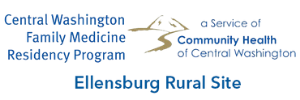Frequently Asked Questions for CWFMR's Rural Program
What sets this program apart from other rural training programs?
Like other rural training programs we believe that residency training in a rural location is the best preparation for practicing medicine in a rural location. What sets us apart is that our Ellensburg rural site is located close enough to the core program in Yakima to make it possible to spend three years in the rural setting, including three years of continuity clinic instead of the two years at most traditional rural track programs. The Ellensburg residents are able to take advantage of the learning opportunities in Yakima throughout the three years. The ability to spend three years living in a rural setting means you have more time to get to know the community, and also more time to develop a continuity patient panel in your clinic. We are in the “Goldilocks” zone for rural training where our town is neither too big nor too small. Ellensburg is a town of 18,000 with a small (25 bed) critical access hospital. The town is large enough to support a wide range of medical services which allows half of the training to occur in Ellensburg while still being small enough to provide a rural experience. The critical access hospital in Ellensburg, Kittitas Valley Healthcare, has a particularly strong Quality department for a critical-access hospital, allowing our residents to participate in quality rounds, peer review committee, and lead inter-disciplinary M&M case presentations.
What are the differences between the training at the Ellensburg rural site and at the core program in Yakima?
The Ellensburg rural site makes it possible for residents to live and train in a rural setting. This means that Ellensburg residents have a smaller clinic as their continuity clinic and opportunities to bond closely with the other Ellensburg residents. Call in Ellensburg is representative of rural practice with a lower volume of calls (averaging 3 per night) and combining clinic phone call with hospital admissions. Ellensburg residents average 5 weeks of call per year over the three years of residency training. In Ellensburg residents have more opportunities for continuity care across locations (Emergency Department, inpatient service, Labor and Delivery, outpatient, SNF, home visits) than their Yakima counterparts. This is partly because Ellensburg residents rotate through every care setting in the community, and partly because Ellensburg is a smaller community with a greater chance to care for a patient in another setting. Ellensburg residents also have more travel time. With roughly half of the rotations taking place in Yakima you will commute daily on many of the Yakima rotations. The commute is 40 minutes and rarely affected by weather. On those rare occasions where weather is an issue there is an apartment available in Yakima for Ellensburg residents to use as a call room. The apartment is also available for residents on Yakima rotations who are fatigued and unsafe to drive home.
What procedure training do your residents receive?
On rotations residents receive training in procedures specific to the rotation. In your continuity clinic procedures performed on-site include: colposcopies, endometrial biopsies, IUD insertions, OB Ultrasounds, normal office surgical procedures and osteopathic manipulation therapy (for DO residents).
How much time is spent in Ellensburg versus Yakima?
Three years of continuity clinic take place in Ellensburg. This allows an opportunity to develop a relationship with your patients. Roughly half of the rotations each year take place in Ellensburg and half in Yakima. The two towns are located 35 miles apart and commuting takes 40 minutes each way. Mileage compensation is offered to Ellensburg residents when commuting back and forth from Ellensburg to Yakima for residency related duties.
